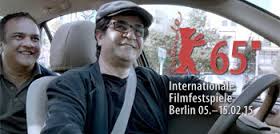
TAXI
Iran, 2015, 85 minutes, Colour.
Directed by Jafar Panahi.
Taxi is quite an entertaining story in itself, but it has to be seen in the life of its director, Jafar Panahi, one Iran’s great film directors, claimed with awards. He fell foul of the authorities in Iran a run and was confined to his home, home imprisonment. He was also forbidden to make films for 20 years.
Panahi received very strong support from international film makers. Encouraged, he used a camera to fill himself in his apartment, for the audience to experience his confinement and way of life, finally going down in the elevator but unable to leave the building. With the ban on his film-making, he called this film This is Not a Film.
Several years later, with a certain amount of freedom of movement within the country, he made another film, Closed Curtain, a sometimes rather enigmatic film about a confined man, his friends, and visitors to his house, and the questioning of identities.
With this film, he has a simple concept (used more in the art-house style by director, Abbas Kierostami in 10) of putting the camera at the front of his taxi, Panahi playing the taxi driver, with a range of passengers, selected and briefed, which meant that the camera could look out from the taxi and see vistas of the city of Tehran. The camera could also easily film the passengers in the back seats but could turn on Panahi himself to see his response to his passengers and their conversations.
The choice of passengers is somewhat provocative for the Iranian authorities. Initially, two people get in, the man rather aggressively traditional in his attitudes towards crime and execution while the woman, turns out to be a teacher with rather liberal views about society. Another passenger is a video bootlegger who claims to know Panahi, goes to visit a film student, enabling Panahi to give some advice about film-making, as well as a selection of foreign language DVDs, all bootleg, which the student would find helpful. The point is made that bootlegging is the only way of distribution for Panahi’s own film.
There are two elderly ladies with a fishbowl who want to get to some fish springs before midday, nattering in the back, irritating Panahi, the bowl breaking but his saving the fish with plastic, and letting them get out of the taxi as soon as possible.
There is also a friend who has some conversation about muggings and dire experiences. The last passenger is the director’s niece, picking her up from school, her being able to recite the rules (very restrictive) for making films in Iran and she is interested in a project, seeing young lad near a wedding party who steals money that has fallen on the ground and her trying to persuade him to give it back while she films him for her project.
The final passenger is a lawyer, who has been banned, but is quite forthright in her government criticisms. When they find a purse in the car, they realise it is from the two ladies and they go to track them down. The final image is of police searching Panahi’s taxi to find the memory stick with the film – but they are unable.
In the spirit of solidarity, the Berlin jury awarded the Golden Bear to Taxi.
1. Panahi and his career, confined to his country, imprisonment, home arrest, the interrogations, the charges, his self-assertion?
2. The films since his internment? A sense of freedom even within his confinement? Making the films? Exporting them, bootleg distribution in Iran?
3. The title, the focus, the day in the taxi? The camera at the front of the taxi, filming the outside, the interiors? The range of passengers? Movement inside and out?
4. Panahi himself, revealed as the driver, some knowing him, some not knowing him? His character, driving the taxi, not knowing the destinations, but his enjoying the experience?
5. The men and the woman passengers, the man and his traditional male ideas, crime, muggings, executions, his spurning of the woman, that she was a teacher? The woman in the back, the teacher, voicing the ideas against imprisonment, capital punishment?
6. The bootlegger and the videos, recognising party, the discussions about films, bootlegging in Iran, his client, the filmmaker, wanting a title for his short film, the discussions about filmmaking and education in Iran? His wanting to look at classics, Panahi and his choices? His inviting Panahi in?
7. The two ladies, their age, carrying the fishbowl? Their wanting to get to their destination before midday? Rituals and superstitions? The breaking of the bowl, Panahi and the plastic? Offloading them?
8. The accident, the man covered in blood, his wife and her frenzy? the irony of photographing the man, his wanting to make his will for his wife, the bootlegger filming it? Going to the hospital? His surviving? The wife and her continuing to call to get the picture of the will?
9. The friend, the discussions about the situation, thieves, muggings?
10. Going to pick up his niece, her behaviour, haughtiness towards her uncle, the details of the rules about filmmaking in Iran? The strictness? Her having to make a short film, seeing the boy, the wedding, his taking the money, calling him over, filming him, her urging him to give the money back?
11. The flower woman, background, lawyer, being banned? Her comments on the situation, looking to camera? the flowers? The voice of unrest in Iran?
12. Finding the purse, driving to the spring?
13. The police, searching, not finding the memory stick?
14. An entertaining film, but with its very serious implications?